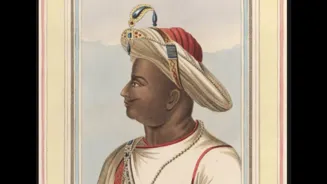The omission of Tipu Sultan, Haidar Ali, and the Anglo-Mysore wars from the new NCERT Class 8 Social Science textbook has drawn attention in Parliament, with the Centre stating that states have the flexibility
to include more content on regional personalities and events in their curricula.
Responding to a question in the Rajya Sabha on Wednesday, Minister of State for Education Jayant Chaudhary said, “Education being a subject in the Concurrent List of the Constitution and the majority of schools being under the jurisdiction of the State Governments, the respective State Government may adopt or adapt NCERT textbooks or develop their own textbooks based on the National Curriculum Framework. The states have flexibility to provide more coverage about regional personalities and events in their textbooks.”
The question was raised by Trinamool Congress MP Ritabrata Banerjee, who asked whether the new Class 8 textbook omits mention of Tipu Sultan, Haidar Ali, or the Anglo-Mysore wars of the 1700s in the chapter on India’s colonial era and the reasons behind such exclusions.
NCERT Textbook Reworked Under NEP 2020
In his written reply, Chaudhary explained that the revised Class 8 Social Science textbook (Part 1) has been developed in line with the National Education Policy (NEP) 2020 and the National Curriculum Framework for School Education (NCFSE) 2023.
“The new textbook comprises four themes: India and the World: Land and the People; Tapestry of the Past; Governance and Democracy; Economic Life Around Us,” he said.
ALSO READ: SC Directs States To Conduct Surveys On Orphaned Children Deprived Of Education
“Personalities featured in these themes have been included contextually and in accordance with curricular objectives. The textbook introduces new pedagogical approaches, emphasizes refined classroom practices, and presents a focused syllabus. These textbooks encourage students to explore more through experiential learning, undertake fieldwork, and focus on evidence-based understanding. The approach adopted for the Middle Stage (Grades 6 to 8) is to provide only a broad survey of Indian civilization from prehistoric times all the way to Independence,” Chaudhary added.
The updated book, released last month, contains a section on early resistance movements against British colonialism leading up to the 1857 revolt. It mentions the Sannyasi-Fakir rebellion, the Kol Uprising, the Santhal rebellion, and various peasant uprisings of the 1800s.
However, the new edition makes no reference to the four Anglo-Mysore wars or the resistance mounted by Tipu Sultan and Haidar Ali against the East India Company — events that were part of the earlier textbook’s section on the expansion of British rule in India.












